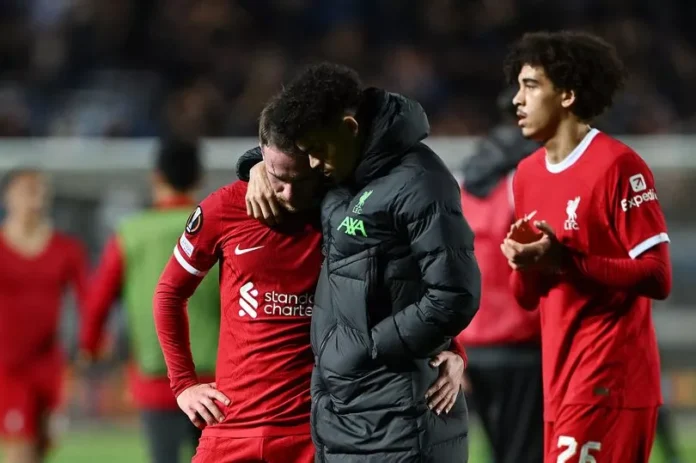Liverpool’s match conclusion during the second leg of their Europa League quarterfinal matchup with Atalanta in Bergamo. Put miracles out of your mind. Now, as Liverpool gets ready for the last few weeks of Jurgen Klopp’s tenure, they have no choice but to deal with a dose of harsh, cold truth.
During the terrifying first leg at Anfield a week ago, it’s possible that the Reds manager’s hopes of winning a Europa League final and finishing with all the major awards under his watch were dashed.
Although Liverpool ended a run of consecutive losses and gained some solace from the victory that night, it would be oversimplifying the situation to say that this return in Bergamo hinted at what might have been.
When Mohamed Salah scored a penalty early in the game, many who were searching for signs quickly pointed out that the seventh minute of the game, when it was converted, was the same as the moment when Divock Origi opened the score against Barcelona five years prior.
But this match was decided long before the final whistle, with Atalanta happy to play the numbers in the second half as Klopp’s team’s early energy and inventiveness started to fade. After the interval, Liverpool did not really produce a noteworthy opportunity.
Although Klopp was eager to downplay parallels between Liverpool’s comeback and that of Barcelona, he did reiterate his belief that Liverpool should “fail in the most beautiful way” if they lose.
That was not this. Indeed, it was simply unpleasant in certain instances. However, things might have turned out differently if Salah, who was freed by Cody Gakpo, had scored on a simple opportunity just before the break. That, however, summed up yet another subpar showing from the Egyptian, whose form is starting to raise serious concerns, especially as the Premier League title battle approaches its finish.
In addition to other advantages, the victory should give Liverpool some confidence as they start a challenging run of three away top-flight games in a week. For his first start in over two months, Trent Alexander-Arnold was impressive; Gakpo was once again clinical; Alisson Becker was the epitome of confidence in the goal; and Alexis Mac Allister put in a lot of effort in the midfield. Additionally, his team’s overall first-half performance included enough bright spots to provide Klopp with a foundation for the next few weeks of play.
But history was very much against Liverpool in this instance, since they had lost the opening game of the tie at Anfield on each of the four previous occasions they had failed to advance in European competition. Furthermore, of the 132 occasions in the history of the Europa League and its predecessor, the UEFA Cup, in which the away team had won the first leg by three goals or more, they had advanced on every one of those occasions.
After saying before the game that Liverpool would just be playing their normal game, but at a significantly higher standard than in the first leg, Klopp resisted the urge to hurl everything at Atalanta from the opening whistle.
Nevertheless, he selected a solid starting lineup, maybe realizing from his error in the first leg, and the clear need for goals, coupled with a desire to escape the Atalanta man-marking that so stifled Liverpool at Anfield, meant that there were some subtle tactical adjustments made throughout the first half.
The only players who seemed to have some flexibility were the number six, Mac Allister, and the center-backs, Virgil van Dijk and Ibrahima Konate.
Leading the assault, Gakpo gave Atalanta trouble with his signature deep runs and willingness to utilize force; Liverpool had been outmuscled for extended periods of time during the previous week. Dominik Szoboszlai pushed high, Andy Robertson was sometimes the left-back who went forward the furthest, and Luis Diaz slipped inside.
On the other side, Alexander-Arnold was active in the inverted right-back position, and it was his cross that gave Liverpool the lead early on when Atalanta wing-back Matteo Ruggeri handled it inside the box.
For his 24th goal of the year, Salah calmly tucked the penalty kick away, but that was as good as it went for the Egyptian. In the first half, he came dangerously near to setting up Diaz and Szoboszlai for goals, but when Salah was sent racing away by a brilliant Gakpo pass, he misread his attempted lob and the ball dropped well wide.
Even though Aleksei Miranchuk missed one goal for Atalanta, the home team only appeared dangerous when Liverpool gave them the ball, which was becoming a more and more annoying problem.
In the second half, things were a little different for Atalanta since they knew that Liverpool would become more desperate as time passed. While the visitors failed to seriously penetrate a retreating home defense, Alisson stopped shots from Ederson and Teun Koopmeiners.
The more the game went on, the more obvious it became that the Reds could not accomplish this goal. Regrettably, despite the team’s best efforts in the first half, the expected burst of energy and forward threat from the raft of substitutions halfway through the half did not materialize.
Out of sheer rage at Liverpool’s elimination, Mac Allister grabbed the closest matchball and smacked his head against it many times as soon as the final whistle blew. After that, as a last act of appreciation, Klopp took his squad to the corner of a still-under-construction Gewiss Stadium.
With Liverpool, Klopp’s European tale comes to an end after three more final appearances and one unforgettable Champions League victory.











